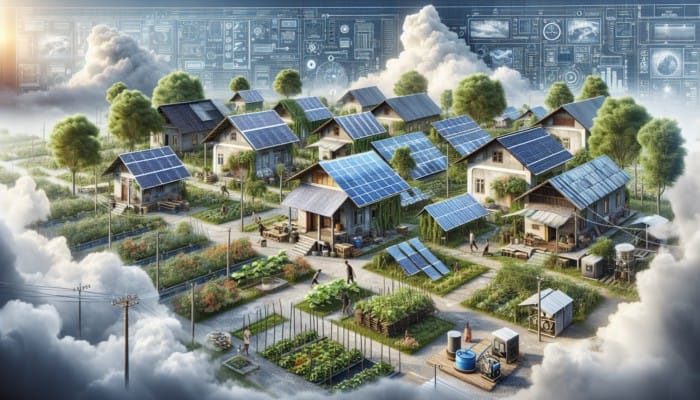Mastering the Art of Surviving a Grid Failure: Your Ultimate Guide
When the lights unexpectedly turn off, panic can quickly set in. However, maintaining your composure is essential for surviving a grid failure. Whether the outage is caused by a natural disaster, technical failures, or cyber-attacks, grid failures can severely disrupt daily life. Understanding how to prepare adequately and react appropriately is crucial for ensuring your safety and well-being during these trying times. These essential tips explore the complexities of surviving a grid failure, providing practical strategies, insights from various sectors, and answers to vital questions that can empower you to handle these situations effectively.
Strategic Preparation for a Grid Failure: Essential Steps to Take

Anticipating a grid failure goes beyond merely having a plan; it requires a comprehensive strategy encompassing various survival aspects. Effective preparation can significantly lessen the impact of a power outage, equipping you with the necessary tools and knowledge to navigate disruptions with ease and confidence.
Essential Items for Your Emergency Kit: A Comprehensive Checklist
An effective emergency kit is the foundation of your preparedness strategy. Start by including crucial items such as flashlights, batteries, first aid supplies, and a multi-tool. Don’t overlook the importance of non-perishable food items and bottled water—aim for at least one gallon per person daily for at least three days. Additionally, consider adding a portable phone charger and any essential medications. When surviving a grid failure, these supplies can mean the difference between chaos and calm.
Tailor your kit to meet personal needs; for instance, families with infants should ensure they include baby food and necessary supplies. Regularly check and update your kit to confirm that food and medications remain within expiry dates. A well-stocked emergency kit provides peace of mind and serves as a crucial lifeline during prolonged outages.
Proactive Power Outage Preparedness: How to Plan Ahead
Effective planning is fundamental to navigating the unpredictable nature of grid failures. Begin by assessing your home’s vulnerabilities—identify which appliances are indispensable and consider investing in a generator for backup power. Solar-powered chargers and battery packs are also excellent assets for keeping small devices operational during outages.
Establish a communication plan with family and friends. Designate a meeting point and ensure everyone knows how to reach one another during a power outage. Stay informed about your area’s infrastructure and potential risks; local news stations and social media can provide real-time updates vital for surviving a grid failure.
Effective Communication Strategies During a Grid Failure

Maintaining communication during a grid failure can be challenging and crucial. Traditional methods may falter without power. It is wise to invest in a battery-operated or hand-cranked radio for receiving emergency broadcasts. Ensure that mobile devices are charged, and consider using text messages or social media platforms to communicate when cellular networks are overwhelmed.
Establish a group chat with family and friends to keep everyone informed. Information can be your most precious asset during a grid failure—knowing where to find resources, shelter, or aid can significantly alleviate anxiety and enhance safety.
Best Practices for Food and Water Storage During Emergencies
Food and water security are non-negotiable during a grid failure. Stock up on non-perishable items such as canned goods, dried fruits, and nuts. Use airtight containers to keep food fresh and protected from pests. Implement a rotation system to ensure you consume older items first.
Water storage is equally essential. If possible, install a rainwater harvesting system or invest in a water filtration system. Familiarising yourself with methods to purify water using household techniques can also be beneficial. Having access to clean drinking water during a power outage is critical, so adopt best practices for surviving a grid failure by ensuring that ample supplies are readily available.
Real-Life Scenarios for Surviving a Grid Failure: Practical Use Cases
Different environments present unique challenges during a grid failure. Understanding these nuances can significantly help tailor your approach, whether in a rural area or a bustling city.
Unique Challenges and Solutions for Rural Areas During Grid Failures

Living in a rural area often means greater distances between resources, making preparation even more critical. Due to limited infrastructure and resources, residents in rural settings may experience prolonged power outages. Consider investing in alternative energy sources like solar panels to provide reliable backup power.
Establishing a community network can be invaluable. Collaborating with neighbours for resources, sharing generators, or pooling supplies can enhance everyone’s preparedness. Furthermore, ensuring your home is equipped for self-sufficiency—such as growing your food and having a reliable water source—can significantly boost your resilience during a grid failure.
Navigating Grid Failures in Urban Settings: Strategies for Survival
In urban environments, crowding and infrastructure can complicate survival during a grid failure. High-rise buildings may lack adequate emergency lighting and ventilation, making it essential to have a well-thought-out contingency plan. Stocking up on essential supplies is crucial, but so is being aware of local resources—identify nearby emergency shelters and community centres that can assist.
Traffic congestion may become a significant concern during urban outages. Familiarise yourself with alternative routes and transport options. Having a bicycle or other means of transportation can prove advantageous when surviving a grid failure in a city setting.
Survival Strategies for Long-Term Grid Failures: Preparing for the Unforeseen
Long-term grid failures can dramatically alter your lifestyle and require a sustainable plan. Focus on energy independence by investing in renewable energy systems like solar or wind power. These systems can provide a steady energy supply, reducing your reliance on the grid.
Developing a community support network can further enhance your survival strategy. To foster resilience, Organise training sessions on food preservation, gardening, and basic survival skills. The more skills you and your community possess, the better equipped you will be to handle extended outages.
Immediate Actions During Short-Term Outages: How to Stay Safe and Comfortable
When faced with a short-term grid failure, immediate actions can help maintain comfort and safety. Firstly, turn off and unplug appliances to prevent damage when power resumes. Use candles and flashlights for lighting, but exercise caution to avoid fire hazards.
Check your emergency kit to ensure that you have everything you need. Staying calm and assessing the situation will help you make informed decisions. Engage in enjoyable activities such as reading or playing board games to keep spirits high, especially if children are present. Remember, surviving a grid failure is about practical preparations and maintaining a positive mindset.
Insights from Industry Experts on Surviving a Grid Failure
To grasp the broader context of grid failures, it is essential to understand industry trends and technological advancements.
The Role of Renewable Energy in Enhancing Grid Stability
Renewable energy sources such as solar, wind, and hydroelectric power are pivotal in improving grid stability. By diversifying energy sources, we can reduce reliance on traditional power grids, making them more resilient to outages. For individuals, investing in renewable energy systems can ensure a reliable power supply during disruptions, thereby improving your chances of surviving a grid failure.
Incorporating energy storage solutions, such as batteries, allows households to store excess energy generated during peak production times. This stored energy can then be utilised during outages, enhancing self-sufficiency.
Transformative Smart Grids: The Future of Power Distribution
Smart grids represent a revolutionary approach to power distribution, employing advanced technologies to improve efficiency and reliability. They enable real-time monitoring and management of energy usage, which can help mitigate the effects of outages.
Adopting smart appliances that communicate with the grid can optimise energy consumption, reducing strain during peak demand times. As smart grid technology continues to evolve, it offers promising solutions for surviving a grid failure in the future.
The Impact of Government Policies on Grid Reliability
Government policies play a critical role in shaping the reliability of power grids. Investment in infrastructure, regulations promoting the adoption of renewable energy, and incentives for energy efficiency are all essential components of a resilient power system.
Advocating for robust policies prioritising grid resilience can significantly enhance community preparedness. Engaging with local representatives and participating in public discussions can facilitate positive change and help create a safer environment for all.
Technological Innovations: Enhancing Grid Resilience
Technological advancements continuously reshape the landscape of grid reliability. Innovations like microgrids offer localised energy solutions, enabling communities to operate independently during outages. These systems can be powered by renewable sources, thus enhancing resilience.
Monitoring technologies that predict and detect outages can also improve response times and reduce the duration of power interruptions. By staying informed about these advancements, individuals can better prepare for surviving a grid failure.
Addressing Audience-Relevant Questions on Surviving a Grid Failure
As concerns about grid failures rise, so do the questions surrounding their impact and our preparedness.
How to Ensure Medical Equipment Remains Operational?
Having a backup power source is absolutely critical for those reliant on medical equipment. Consider investing in a generator or an uninterruptible power supply (UPS) to maintain functionality during outages. Consult with healthcare providers for tailored advice to ensure your needs are met.
What Actions to Take If You’re Away from Home During an Outage?
If you’re away and the grid fails, ensure you have a plan. Inform neighbours or family members about your absence, and consider using smart home systems to monitor conditions remotely. This proactive approach can help you stay informed of your home’s status.
Can Solar Panels Provide Power During a Grid Failure?
Absolutely! Solar panels can be a reliable energy source during grid failures, especially when paired with battery storage systems. This setup allows you to harness solar energy even when the grid is down, ensuring you can access power when it is needed most.
What Is the Maximum Duration You Can Survive Without Power?
Survival without power varies based on individual preparedness and available resources. With a well-stocked emergency kit, access to food and water, and effective strategies, you can sustain yourself for extended periods, ensuring your safety and well-being.
Exploring Long-Tail Keywords for Enhanced Preparedness
As we delve into the vast landscape of preparing for grid failures, certain long-tail keywords can enhance your search for information and resources.
Grid Failure Survival Kits: Must-Have Items for Your Preparedness
A comprehensive survival kit should include essential supplies such as food, water, first aid items, and tools. Research and curate a detailed list of items catering to your needs and environment to ensure you’re adequately prepared.
Adopting Off-Grid Living: Strategies for Power Outages
Embracing an off-grid lifestyle can significantly enhance your resilience to power outages. Learn about sustainable living practices, renewable energy sources, and self-sufficiency strategies to thrive during grid failures and ensure your family is well-equipped.
The Impact of Grid Failures on Small Businesses: Mitigation Strategies
Small businesses are particularly vulnerable to grid failures. Understanding the potential impact and developing contingency plans can help mitigate losses and protect your livelihood during outages, ensuring your business remains operational.
Enhancing Community Preparedness for Grid Failures: Collaborative Strategies
Community preparedness is vital for enhancing resilience against grid failures. Organising workshops, sharing resources, and developing local response strategies can foster a stronger, more prepared community that can effectively navigate emergencies together.
Understanding the Broader Implications of Grid Failures
Grid failures carry implications beyond mere inconvenience; they can affect psychological, economic, and environmental health.
The Psychological Impact of Grid Failures: Addressing Mental Health
The psychological effects of grid failures should not be underestimated. Anxiety, stress, and feelings of helplessness may arise during outages. Establishing support networks and engaging in community activities can alleviate these pressures and foster individual resilience.
Economic Consequences of Prolonged Outages: Planning for Financial Resilience
Prolonged outages can lead to significant economic consequences, particularly for businesses that rely on electricity. Understanding these impacts can drive better preparedness and encourage investment in infrastructure improvements, ultimately safeguarding your financial interests.
Environmental Factors Contributing to Grid Failures: Understanding the Risks
Environmental factors, such as extreme weather events, play a significant role in grid reliability. Understanding these connections can inform better planning and preparedness strategies, enabling individuals and communities to adapt more effectively to changing conditions.
Learning from Historical Case Studies of Major Grid Failures
Examining historical case studies provides valuable insights into grid failures and their aftermath. Analysing past events can inform current preparedness efforts and highlight the importance of infrastructure resilience, ensuring that we are better prepared for future challenges.
Frequently Asked Questions About Grid Failures
What constitutes a grid failure?
A grid failure occurs when the electrical power grid breaks down, leading to widespread power outages that can affect homes, businesses, and essential services.
What steps can I take to prepare for a grid failure?
Preparing involves creating a comprehensive emergency kit, planning for power outages, and establishing effective communication strategies while ensuring adequate food and water storage.
What essential items should I include in my emergency kit?
Your emergency kit should include flashlights, batteries, first aid supplies, non-perishable food, bottled water, and any necessary medications to ensure safety.
How can I keep my family safe during a grid failure?
Ensure your home is well-equipped with emergency supplies, maintain clear communication, and create a safety plan to keep your family informed and secure.
What are the most common causes of grid failures?
Common causes include severe weather conditions, technical malfunctions, cyber-attacks, and increased demand on the electrical grid during peak times.
How long can a grid failure typically last?
The duration of a grid failure varies depending on the cause and response efforts; it can last from a few hours to several days or potentially longer in severe cases.
Are generators a safe option during a grid failure?
Yes, generators can provide backup power when used properly. However, they must be operated safely in well-ventilated areas to prevent the risk of carbon monoxide poisoning.
What can I do to help my community prepare for grid failures?
Engage with local organisations, participate in community planning sessions, and share resources and knowledge to enhance collective preparedness for all.
What role do renewable energy sources play in ensuring grid reliability?
Renewable energy sources contribute significantly to grid reliability by diversifying the energy supply and reducing dependency on traditional power sources, fostering a more resilient system.
How can I stay informed during a grid failure?
Stay informed through battery-operated radios, mobile alerts, and social media updates to receive real-time information during outages and stay aware of the latest developments.
Explore our world on X!
Post-Disaster Bartering: Essential Strategies
Exploring the Concept of Post-Disaster Bartering What Is the Concept of Post-Disaster Bartering? Post-Disaster Bartering: Post-disaster bartering refers to the exchange of goods and services that occurs when conventional currency systems collapse due to catastrophic events, such as natural disasters, economic crises, or societal upheavals. During these critical moments, individuals and communities utilise the resources […]
Hurricane Generator Use: Powering Through Storms
Maximising the Benefits of Hurricane Generator Usage What Exactly Are Hurricane Generators? Hurricane Generator Use: Hurricane generators are advanced power supply devices specifically engineered to deliver electricity during extreme weather events, particularly during hurricanes, when standard power infrastructures may fail. These robust machines ensure that both residential and commercial establishments receive the power they need, […]
Emergency Family Plan: Universal Preparation Guide
Comprehensive Elements to Include in Your Family Emergency Plan Effective Communication Strategies for Emergencies Emergency Family Plan: Establishing effective communication strategies is absolutely vital for ensuring that family members remain connected and informed during emergencies. It’s crucial to have clear, reliable methods in place that everyone understands and can utilise effortlessly. This encompasses traditional communication […]
Survival Water Bottles: Essential Gear for Emergencies
Why Survival Water Bottles are Essential for Emergency Preparedness Understanding the Significance of Hydration in Crisis Situations Survival Water Bottles: Maintaining hydration is vital for ensuring optimal bodily functions during emergencies. In scenarios where access to clean water is limited, sustaining proper hydration is crucial in preventing health complications associated with dehydration, which can include […]








This guide to surviving a grid failure is a much-needed resource, especially as we observe the increasing frequency of extreme weather events and cybersecurity threats. Preparing for such situations is not just about having candles and flashlights on hand—it’s an opportunity to rethink how we engage with our environment and each other in times of crisis.
You’ve captured something essential about this topic. It’s true that as we face more extreme weather and security challenges, our approach to preparedness needs to evolve. Rethinking how we engage with our environment means not just looking at supplies but also considering our community ties.
You’ve hit the nail on the head with your thoughts on preparedness. It’s true that surviving a grid failure involves way more than just having a stash of candles and flashlights. When we gear up for potential disruptions, we also get a chance to foster a sense of community. Engaging with our neighbors, sharing resources, and brainstorming solutions together can strengthen those bonds we often overlook in our daily routines.
It’s a sobering reality how often we take our power sources for granted until something disrupts that comfort. Your emphasis on maintaining composure is particularly important; I remember a time when a severe storm knocked out our power for several days. We had some supplies, but we quickly learned that communication became a challenge, too. I realized how vital it was to have battery-powered radios and to establish check-in systems with family and neighbors. It really altered my perspective on community support during such crises.
You bring up such a crucial point about how often we overlook the importance of reliable power sources until they’re taken away. It’s easy to get caught up in daily routines, relying on electrical convenience without considering the underlying systems that make it all happen. When a storm hits and suddenly we find ourselves in the dark, it can be a real wake-up call.
“Absolutely, your experience highlights the importance of preparedness and community! If you’re looking for some reliable resources to enhance your emergency readiness, check this out.”
https://survivalbite.com/LostFoods
You’ve pinpointed something that really resonates with me. It’s remarkable how quickly our sense of normalcy can shift, especially when we take reliable electricity for granted. I’ve had a similar wake-up call during power outages after storms—it was a reminder to appreciate the little things, like the simple act of flipping a switch and having light. Beyond just the immediate inconvenience, I think it also sheds light on our broader reliance on technology.
This guide resonates deeply with me, particularly in today’s world where we often take the reliability of our energy sources for granted. The psychological aspect of a grid failure is indeed significant; I remember a storm last year that knocked out power in my neighborhood for a couple of days. The initial panic was overwhelming, especially while trying to manage my young children and maintain some semblance of normalcy.
Your insights on preparing for grid failures tap into such an important aspect of modern life. It’s interesting how our reliance on technology can leave us unprepared for sudden outages, highlighting the need for us to cultivate resilience in both our personal and community frameworks. In my neighborhood, we have a community group that focuses on emergency preparedness, which has fostered a sense of cooperation among residents. We share resources like backup generators and emergency supplies, but it also allows us to practice simulations that can build confidence and skills for real situations.